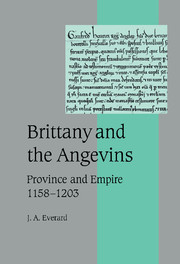Book contents
- Frontmatter
- Contents
- List of figures and maps
- Preface
- List of abbreviations
- Genealogy of the dukes of Brittany, 1066–1203
- The principal political divisions of Brittany, c. 1066
- Ducal domains, c. 1066–1186
- Introduction
- 1 Ducal Brittany, 1066–1166
- 2 Henry II and Brittany
- 3 The government of Brittany under Henry II
- 4 Duke Geoffrey and Brittany, 1166–1186
- 5 Duke Geoffrey, Henry II and the Angevin empire
- 6 The end of Angevin Brittany, 1186–1203
- Conclusion
- Appendices
- 1 The ‘Assize of Count Geoffrey’
- 2 The hereditary seneschals of Rennes
- 3 Angevin officers in Brittany
- 4 The right of Wreck and ducal brefs de mer
- Bibliography
- Index
- Cambridge Studies in Medieval Life and Thought Fourth series
3 - Angevin officers in Brittany
Published online by Cambridge University Press: 15 December 2009
- Frontmatter
- Contents
- List of figures and maps
- Preface
- List of abbreviations
- Genealogy of the dukes of Brittany, 1066–1203
- The principal political divisions of Brittany, c. 1066
- Ducal domains, c. 1066–1186
- Introduction
- 1 Ducal Brittany, 1066–1166
- 2 Henry II and Brittany
- 3 The government of Brittany under Henry II
- 4 Duke Geoffrey and Brittany, 1166–1186
- 5 Duke Geoffrey, Henry II and the Angevin empire
- 6 The end of Angevin Brittany, 1186–1203
- Conclusion
- Appendices
- 1 The ‘Assize of Count Geoffrey’
- 2 The hereditary seneschals of Rennes
- 3 Angevin officers in Brittany
- 4 The right of Wreck and ducal brefs de mer
- Bibliography
- Index
- Cambridge Studies in Medieval Life and Thought Fourth series
Summary
ROYAL SENESCHALS OF NANTES
William fitz Hamo (1158–1172)
William's origins are obscure, but may have been in the honour of Richmond. He held the soke of Hough-on-the-Hill, Lincs., probably by a grant of Conan IV's father (EYC, iv, p. 80; Société Jersiaise (ed.), Cartulaire des Iles Normandes: Recueil de documents concernant l'histoire de cesîles, Jersey, 1924, no. 252). He may also be identified with William son of Hamo dispensator of Hudswell, near Richmond (Monasticon, iii, p. 602). William also had some connection with the Channel Islands, where he founded the abbey of Saint-Hélier (RT, ii, pp. 134–5; Cartulaire des Iles Normandes, p. 307). He also held lands in Normandy (RT, II, p. 135 note; Cartulaire des Iles Normandes, no. 239). William served Henry II for some years before he became king, and was rewarded with lands in the south of England, at Salisbury and Warminster (Pipe Rolls 2–18 Henry II; for the significance of these grants, see T.K. Keefe, ‘Place-date distribution of royal charters and the historical geography of patronage strategies at the court of king Henry II Plantagenet’, Haskins Society Journal 2 (1990), 179–88 at 184).
William played a prominent role in Henry II's regime in Brittany from the outset, acting as principal royal agent in Nantes from 1158. On at least one occasion between 1160 and August 1167, he visited Conan IV at Guingamp (EYC, iv, p. 60), no doubt on the king's business.
- Type
- Chapter
- Information
- Brittany and the AngevinsProvince and Empire 1158–1203, pp. 207 - 212Publisher: Cambridge University PressPrint publication year: 2000



